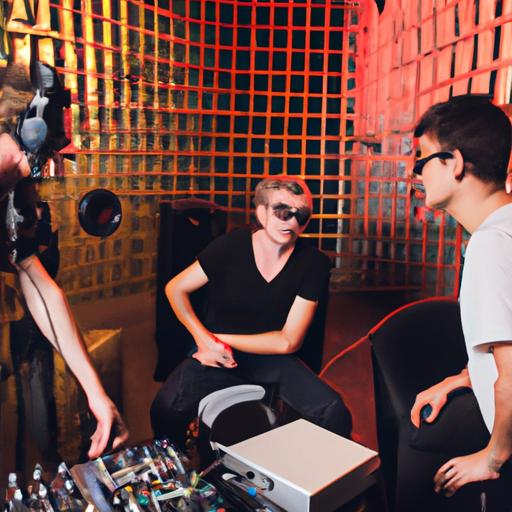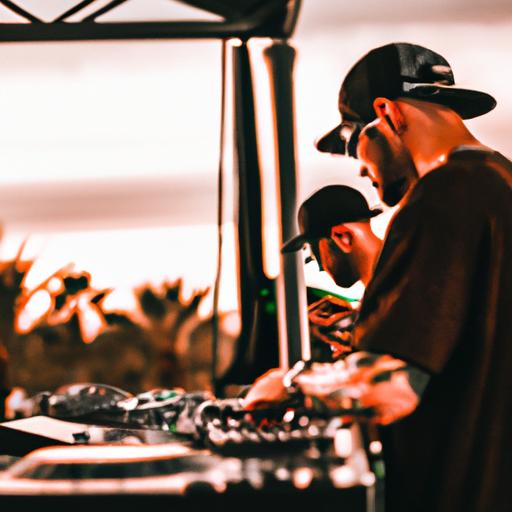Understanding B2B DJing in the Music Industry: An Extensive Guide
As a music enthusiast, you’ve likely encountered the term “B2B” in the DJ industry. But what exactly does it mean, and why is it significant? In this guide, we will delve into the world of B2B DJing and explore its relevance in the music industry.
What is B2B?

B2B, an abbreviation for “back-to-back,” refers to a style of DJing where two or more DJs perform together on the same set. They take turns playing tracks and collaborate to create a unique and seamless sound. B2B sets can be executed by DJs with similar styles or complementary genres, bringing together different experiences and perspectives to produce an extraordinary performance.
Importance of B2B in the DJ Industry
B2B DJ sets have gained increasing popularity in recent years. DJs collaborate to create unforgettable performances that showcase their skills and creativity. These sets also provide a platform for emerging DJs to showcase their talents and gain exposure in the industry. Furthermore, B2B collaborations foster knowledge sharing among DJs, leading to new ideas and innovations in music production and performance.
A Brief History of B2B in Music
B2B DJing has a longstanding history that dates back to the 1970s, where DJs would take turns playing records at house parties. Over time, B2B DJ sets have become a staple in the music industry, with DJs from all over the world collaborating to create unique and innovative performances. Technological advancements have made B2B sets more accessible, allowing DJs to collaborate across different locations and time zones using digital platforms and tools.
Now, let’s delve deeper into the fundamentals of B2B DJing, exploring its definition and how it differs from other styles of DJing.
The Basics of B2B DJing
Definition of B2B DJing
B2B DJing is a collaborative form of DJing where two or more DJs perform together on the same set. Each DJ takes turns playing tracks, collaborating to create a distinctive sound that blends their individual styles and genres.
How B2B Differs from Solo DJing or Back-to-Back DJing
B2B DJing differentiates itself from both solo DJing and back-to-back DJing. In solo DJing, one DJ performs alone, playing their own tracks and showcasing their individual style and skills. On the other hand, back-to-back DJing involves two DJs performing together on the same set, but they take turns playing tracks rather than collaborating on the same tracks.
Benefits and Challenges of B2B DJing
B2B DJing offers several advantages. It allows DJs to collaborate with others, creating a unique sound that showcases each DJ’s strengths. B2B sets also serve as a platform for emerging DJs to gain exposure and develop their skills. However, B2B DJing comes with its challenges, including the need for effective communication between DJs, potential conflicts due to differing styles or genres, and meticulous planning and coordination to ensure a seamless performance.
Now let’s explore how B2B DJing functions within the business of DJing, including its benefits and drawbacks for DJs and clients.
B2B in the Business of DJing
B2B DJing does not only contribute to creating extraordinary performances; it also has a significant impact on the business side of the DJ industry. In this section, we will explore how B2B operates in the DJ business, its advantages and disadvantages for DJs and clients, as well as its effects on pricing and contracts.
How B2B Works in the DJ Business
B2B collaborations in the DJ industry can take various forms, depending on the nature of the event or project. For instance, DJs can collaborate on a single event, taking turns to play tracks and delivering a cohesive performance. Alternatively, DJs may join forces on a production project, leveraging their skills and ideas to create a one-of-a-kind sound. Regardless of the form it takes, successful B2B DJing requires high levels of communication and coordination among the collaborating DJs.
Advantages and Disadvantages of B2B for DJs and Clients
B2B DJing presents several advantages for DJs and clients alike. For DJs, B2B sets provide exposure and opportunities to collaborate with other DJs and music professionals. It also fosters new ideas and innovations in music production and performance. From a client’s perspective, B2B sets offer a unique and unforgettable experience, with multiple DJs collaborating to create an extraordinary performance.
However, B2B DJing also has its disadvantages. Coordinating schedules and styles with other DJs can be challenging for individual DJs, requiring a considerable level of trust and communication. Additionally, B2B sets tend to be more expensive than solo DJ sets, and they may not cater to all audience preferences.
How B2B Affects Pricing and Contracts
B2B DJing influences pricing and contracts in the DJ industry. B2B sets generally command higher rates than solo DJ sets due to the additional time and resources required to coordinate and collaborate with other DJs. Furthermore, B2B collaborations may entail separate contracts and agreements between the collaborating DJs and the client, outlining the terms and conditions of the collaboration.
Let’s now explore how B2B collaborations are transforming the music industry and the opportunities they create for DJs and music professionals.
B2B in the Music Industry
B2B collaborations have a profound impact on the music industry, transforming various aspects from music production to distribution. Let’s delve into how B2B is changing the music industry.
How B2B Affects Music Production and Distribution
B2B collaborations revolutionize the way music is produced and distributed. DJs and music producers can now collaborate on music projects from different locations using digital platforms and tools. This convergence of styles and perspectives leads to unique and innovative sounds. B2B collaborations also provide opportunities for music distribution, as DJs and producers share their music with each other’s audiences, expanding their reach in the industry.
Examples of B2B Collaborations in the Music Industry
B2B collaborations have become increasingly prevalent in the music industry, with DJs and producers joining forces to create memorable performances and groundbreaking music. One notable B2B collaboration transpired between Swedish House Mafia and Knife Party, who performed together at the 2012 Ultra Music Festival, leaving an indelible mark. Other examples of B2B collaborations include Adam Beyer and Joseph Capriati, Jamie Jones, and Seth Troxler, and Carl Cox and Green Velvet.
How B2B Is Changing the Music Industry
B2B collaborations bring about significant changes in the music industry. They provide emerging DJs and music producers with opportunities to showcase their talents, gain exposure, and contribute to the industry’s growth. B2B collaborations also fuel innovations in music production and performance, as DJs and producers experiment with different styles and techniques to create unique and unforgettable experiences. Moving forward, B2B collaborations will continue to play a pivotal role in shaping the future of the music industry.
Now, let’s examine how B2B DJing is facilitated in the digital age, including the platforms and tools that enable collaborations.
B2B in the Digital Age
The rise of digital technology has revolutionized the way DJs collaborate and perform together. In this section, we will explore how B2B is facilitated by digital platforms and tools, popular B2B platforms for DJs and music professionals, and how B2B is evolving in the digital age.
How B2B Is Facilitated by Digital Platforms and Tools
Digital platforms and tools have simplified collaboration among DJs. Online platforms like SoundCloud and Mixcloud allow DJs to share their music with each other and their audiences. Social media platforms such as Twitter and Instagram provide spaces for DJs to connect and share experiences. Additionally, digital tools like Ableton Live and Traktor enable DJs to synchronize their tracks and perform together seamlessly, even across different locations and time zones.
Popular B2B Platforms for DJs and Music Professionals
Several popular B2B platforms aid collaboration and networking in the industry. Boiler Room, for instance, streams live DJ performances and provides a space for DJs to connect with each other and their audiences. Resident Advisor offers a comprehensive database of DJs and events worldwide, while Beatport allows DJs to buy and sell tracks and collaborate with other artists.
How B2B Is Evolving in the Digital Age
Advancements in technology continue to drive the evolution of B2B collaborations in the DJ industry. Virtual reality and augmented reality technologies create immersive B2B experiences. Blockchain technology streamlines collaboration and music distribution. Moreover, the prominence of social media and online streaming platforms makes it easier for DJs to connect with both their peers and audiences, leading to new opportunities for collaboration and innovation.
In Conclusion
Understanding the significance of B2B DJing in the music industry is crucial for appreciating the art of collaborative DJing. B2B DJ sets provide DJs with a unique platform to showcase their skills, collaborate with other artists, and create extraordinary experiences for their audience. As B2B sets gain popularity and accessibility, it is essential for DJs and music enthusiasts to grasp the fundamentals of B2B DJing, as well as its impact on the music industry as a whole.
Moving forward, B2B collaborations will continue to shape the future of DJing. They have the potential to bring together diverse talents, sounds, and perspectives to create something truly unique and innovative. Whether you are a seasoned DJ or a music enthusiast, embracing the world of B2B DJing can lead to new experiences, collaborations, and opportunities in the music industry. So go ahead, find your B2B partner, and create something amazing together.

